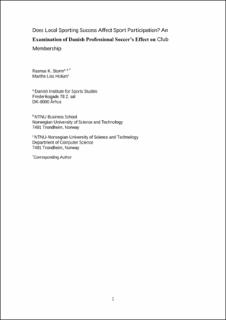Does Local Sporting Success Affect Sport Participation? An Examination of Danish Professional Soccer’s Effect on Club Membership
Peer reviewed, Journal article
Accepted version

Åpne
Permanent lenke
https://hdl.handle.net/11250/2673783Utgivelsesdato
2020Metadata
Vis full innførselSamlinger
- Institutt for datateknologi og informatikk [6778]
- NTNU Handelshøyskolen [1623]
- Publikasjoner fra CRIStin - NTNU [38127]
Originalversjon
10.1080/16184742.2020.1739726Sammendrag
The body of literature examining potential trickle-down effects from elite sport success to mass sport participation has grown considerably over the years. The evidence is mixed but generally suggests that when a nation’s athletes win medals at international tournaments – for example the Olympic Games or the FIFA World Cup – it cannot be expected to inspire amateurs to take up sport themselves. So far, existing research has primarily focused on international elite success. Effects from local elite clubs playing in national leagues have only been examined once. Since recent research indicates that national and cultural contexts can influence whether a potential trickle-down effect materialises, this paper aims to test these factors in another setting. By deploying panel data regression models on data from Danish top-tier professional soccer, we test whether local club performance affects local membership levels in Denmark. We do not find direct positive effects from sporting success. However, we do identify negative effects on membership figures due to club relegation indicating that sporting failure can affect mass participation. A key recommendation drawn from this study is that politicians, sport managers and civil servants should be careful using the double pyramid/‘virtuous circle of sport’ metaphor as the basis of their decision-making because it is an imprecise theoretical interpretation of reality. Instead, stakeholders should focus effort and resources on other relevant factors that potentially can lead to higher – or even lower – levels of participation in order to stimulate such factors (or prevent those that affects negatively). Future studies should examine these implications further.